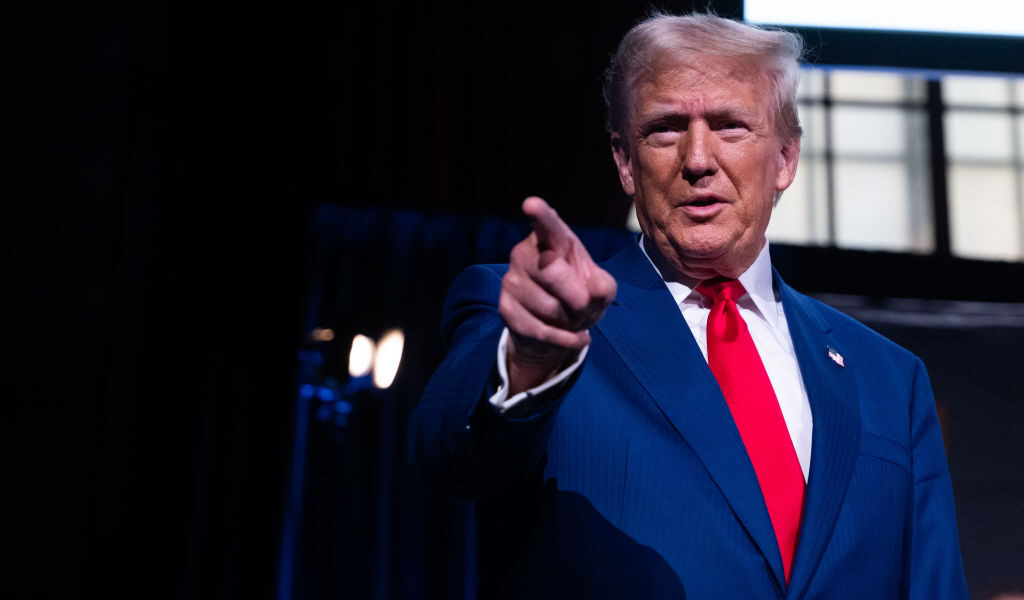Speaking at the Economic Club of New York on Thursday, Donald Trump sketched the outline of a new policy fusion, bringing together elements of traditional Republican economics and populist priorities. A titanic clash between “Reaganism” and “Trumpism” is catnip for American pundits, but Trump builds on longstanding Republican economic themes.
The goal of this new populist fusion is capacity. Like his Republican predecessors, Trump has pledged to expand energy production at home. This would at once bring down bills for American families and make it easier to build back the US industrial base, which Trump has set as a key priority. The former president’s emphasis on deregulation is another note in harmony with Reaganite policymaking; as with energy production, this is pitched as a way of expanding economic growth.
Trump is also attempting to build bridges with the tech sector. In addition to saying he would appoint ally Elon Musk to lead a commission on Government efficiency, Trump has specifically highlighted how he would promote cryptocurrencies and make the United States a world leader in AI. This is a fusion of Silicon Valley and the Rust Belt — aiming to strengthen the industrial base while taking the lead in cutting-edge technologies.
Republicans have long used tax policy as a major lever for economic policy in general, an approach on which Trump puts a distinctive spin. His first term was characterised by standard-issue GOP thinking on taxes; Paul Ryan was, after all, a singular influence on the 2017 tax bill. So far this campaign season, Trump’s tax policies have evolved. He had long pushed for another cut to the corporate tax rate — from 21% to 15% — but his New York speech suggested that he would make this more targeted. He said that only companies that “make their product in America” would enjoy this new, reduced rate, as well as receive other tax incentives for research and development.
How to apply that selective rate would be unclear, but tax incentives for domestic manufacturing would dovetail with another policy measure which Trump has talked up: tariffs. With Joe Biden extending many of Trump’s tariffs on the People’s Republic of China, the GOP nominee perhaps feels that his approach to trade has been vindicated. Now, he seems intent on trying to push the tariff agenda even further in a second term.
Besides raising tariffs on China, Trump has also indicated some sympathy for boosting tariffs across the board in order to encourage more domestic manufacturing. Many of the 2017 tax cuts for individuals are set to expire in 2025, and he has pledged further cuts such as exempting Social Security payments from income tax. Tariffs, he claims, could help pay for these other efforts.
As president, Trump would have considerable manoeuvring room to roll back administrative regulations and incentivise the production of more energy. Because Congress gives the president great latitude in setting trade policy, Trump also used executive action to raise tariffs on Beijing in the past. Both his critics and his allies think he might use the International Emergency Economic Powers Act to raise tariffs more broadly. That exercise of power might invite a legal battle, so a clearer way forward would be through Congress — whose legislation would also be required to make some of these other tax proposals a reality.
How this agenda would fare in Congress in part depends upon down-ballot election results, and there remain tensions within the GOP coalition on many of these issues. Targeted efforts to restrict trade with China or rebuild American defence manufacturing likely have more of a consensus than an across-the-board tariff agenda, which would be disruptive for many businesses. While Trump has long been indifferent to deficit spending, the explosion of the national debt since 2020 increasingly worries policymakers. Even some populist voices — including the New Right think tank American Compass — have argued that Republicans need to take decisive action to confront deficits. Those fiscal pressures could shape the ultimate trajectory of Trump’s economic agenda in a second term.











Join the discussion
Join like minded readers that support our journalism by becoming a paid subscriber
To join the discussion in the comments, become a paid subscriber.
Join like minded readers that support our journalism, read unlimited articles and enjoy other subscriber-only benefits.
Subscribe